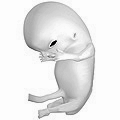Definify.com
Webster 1913 Edition
Fetus
Fe′tus
(fē′tŭs)
, Noun.
pl.
Fetuses
(fē′tŭs-ĕz)
. [L.
fetus
, foetus
, a bringing forth, brood, offspring, young ones, cf. fetus
fruitful, fructified, that is or was filled with young; akin to E. fawn
a deer, fecundity
, felicity
, feminine
, female
, and prob. to do
, or according to others, to be
.] The young or embryo of a vertebrate animal in the womb, or in the egg; often restricted to the later stages in the development of viviparous and oviparous animals. showing the main recognizable features of the mature animal,
embryo
being applied to the earlier stages. [Written also
fœtus
.] Webster 1828 Edition
Fetus
FE'TUS
,Noun.
plu.
Feu de joie, fire of joy, a French phrase for a bonfire, or a firing of guns in token of joy.
Definition 2026
fetus
fetus
English

A fetus at eight weeks from conception.
Alternative forms
- (UK, hypercorrect) foetus
- (UK, rare, hypercorrect) fœtus
- (obsolete, erroneous) phoetus, phœtus
- (obsolete, erroneous) faetus, fætus
Noun
fetus (plural fetuses or feti)
- (Canada, US) An unborn or unhatched vertebrate showing signs of the mature animal.
- 1963, John W Choate, Henry A. Thiede, University of Rochester School of Medicine and Dentistry, Transcript, Volume 2
- Several feti were removed from every rats' uterus, stripped of their membranes and allowed to lie in the peritoneal cavity connected to the placenta by the umbilical cord and with the placenta still attached to the uterine wall.
- 1963, John W Choate, Henry A. Thiede, University of Rochester School of Medicine and Dentistry, Transcript, Volume 2
- (Canada, US) A human embryo after the eighth week of gestation.
- The sequence is: molecules in reproductive systems, then gametes, zygotes, morulas, blastocysts, and then fetuses.
Usage notes
- The form fetus is preferred in North America and in the scientific community, whereas foetus is still commonly used in Commonwealth nations.
Derived terms
Translations
fetus
|
|
See also
References
Anagrams
Latin
Etymology
From Proto-Indo-European *dʰeh₁(y)-, see also Sanskrit धयति (dhayati), Avestan 𐬛𐬀𐬉𐬥𐬎 (daēnu), Old Armenian դիեմ (diem) and Old Church Slavonic доити (doiti).
Pronunciation
- (Classical) IPA(key): /ˈfeː.tus/, [ˈfeː.tʊs]
Adjective
fētus m (feminine fēta, neuter fētum); first/second declension
Inflection
First/second declension.
| Number | Singular | Plural | |||||
|---|---|---|---|---|---|---|---|
| Case / Gender | Masculine | Feminine | Neuter | Masculine | Feminine | Neuter | |
| nominative | fētus | fēta | fētum | fētī | fētae | fēta | |
| genitive | fētī | fētae | fētī | fētōrum | fētārum | fētōrum | |
| dative | fētō | fētō | fētīs | ||||
| accusative | fētum | fētam | fētum | fētōs | fētās | fēta | |
| ablative | fētō | fētā | fētō | fētīs | |||
| vocative | fēte | fēta | fētum | fētī | fētae | fēta | |
References
- fetus in Charlton T. Lewis and Charles Short (1879) A Latin Dictionary, Oxford: Clarendon Press
Noun
fētus m (genitive fētūs); fourth declension
- A bearing, birth, bringing forth.
- Offspring, young, progeny.
- Fruit, produce.
- (figuratively) Growth, production.
Inflection
Fourth declension.
| Case | Singular | Plural |
|---|---|---|
| nominative | fētus | fētūs |
| genitive | fētūs | fētuum |
| dative | fētuī | fētibus |
| accusative | fētum | fētūs |
| ablative | fētū | fētibus |
| vocative | fētus | fētūs |
Descendants
Related terms
References
- fetus in Charlton T. Lewis and Charles Short (1879) A Latin Dictionary, Oxford: Clarendon Press
- fetus in Charlton T. Lewis (1891) An Elementary Latin Dictionary, New York: Harper & Brothers
- Félix Gaffiot (1934), “fetus”, in Dictionnaire Illustré Latin-Français, Paris: Hachette.
Serbo-Croatian
Pronunciation
- IPA(key): /fěːtus/
- Hyphenation: fe‧tus
Noun
fétus m (Cyrillic spelling фе́тус)
Declension
Declension of fetus
| singular | plural | |
|---|---|---|
| nominative | fetus | fetusi |
| genitive | fetusa | fetusa |
| dative | fetusu | fetusima |
| accusative | fetus | fetuse |
| vocative | fetuse | fetusi |
| locative | fetusu | fetusima |
| instrumental | fetusom | fetusima |